EU Political Economy: Models, Euro Conceptions, and Their Reflection
VerifiedAdded on 2023/06/13
|6
|1358
|271
Essay
AI Summary
This essay examines the diverse political economy models present within European Union member states and how these models influence varying conceptions of the Euro and its purpose. It delves into the interdisciplinary nature of political economy, focusing on the relationships between individuals, public policy, and government bodies. The analysis considers neoclassical, Marxist, and institutionalist perspectives within the international political economy, highlighting the use of economic theory to predict the behavior of political actors and the formulation of policies. The essay also addresses the role of neoliberalism and the Euro's significance as the currency for many EU countries. The discussion supports taking instances from various literature that is available on journals articles and books. It concludes that differences in political economy models among EU states reflect varying conceptions of the Euro, often rooted in the traditional beliefs and cultures of each region.
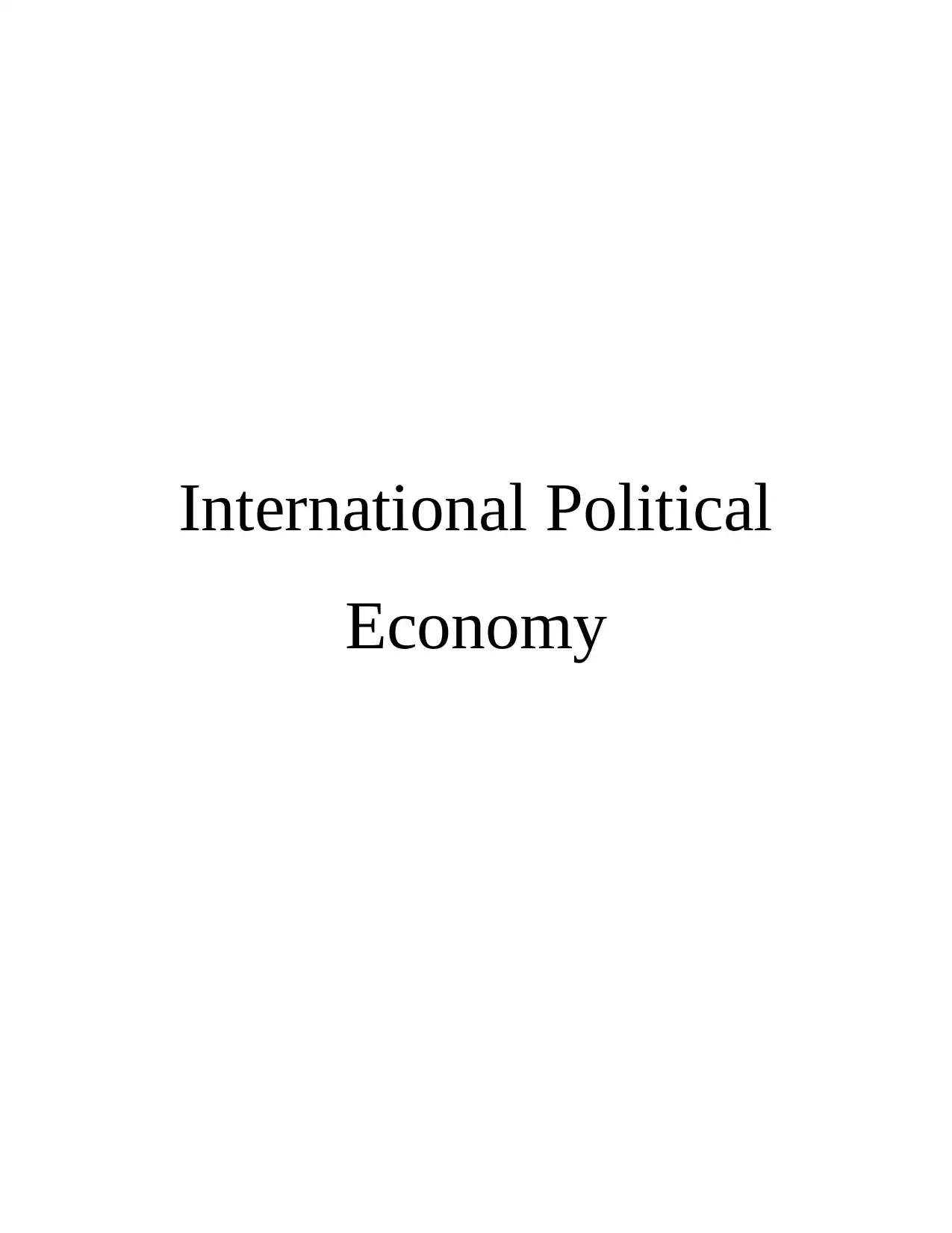
International Political
Economy
Economy
Paraphrase This Document
Need a fresh take? Get an instant paraphrase of this document with our AI Paraphraser
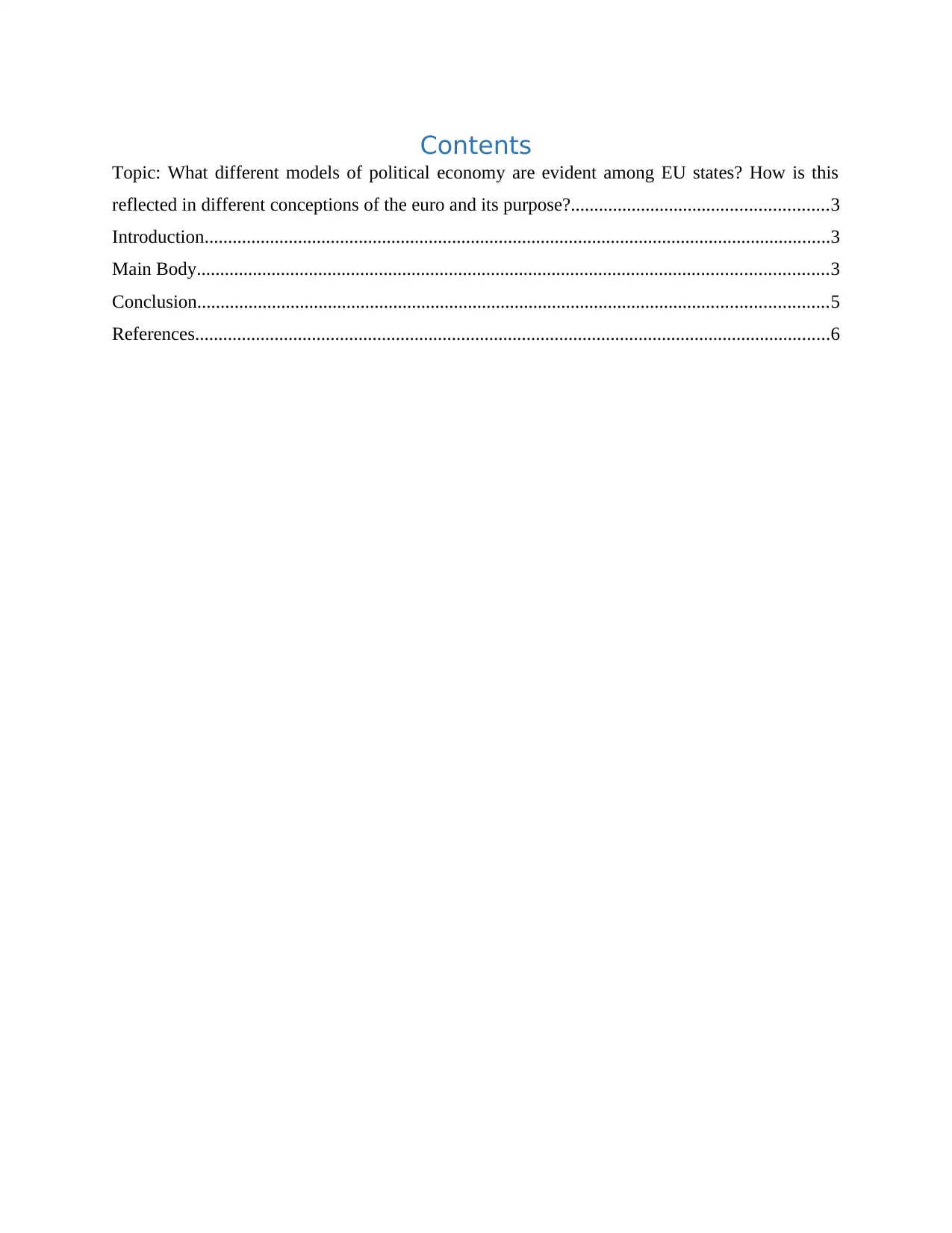
Contents
Topic: What different models of political economy are evident among EU states? How is this
reflected in different conceptions of the euro and its purpose?.......................................................3
Introduction......................................................................................................................................3
Main Body.......................................................................................................................................3
Conclusion.......................................................................................................................................5
References........................................................................................................................................6
Topic: What different models of political economy are evident among EU states? How is this
reflected in different conceptions of the euro and its purpose?.......................................................3
Introduction......................................................................................................................................3
Main Body.......................................................................................................................................3
Conclusion.......................................................................................................................................5
References........................................................................................................................................6
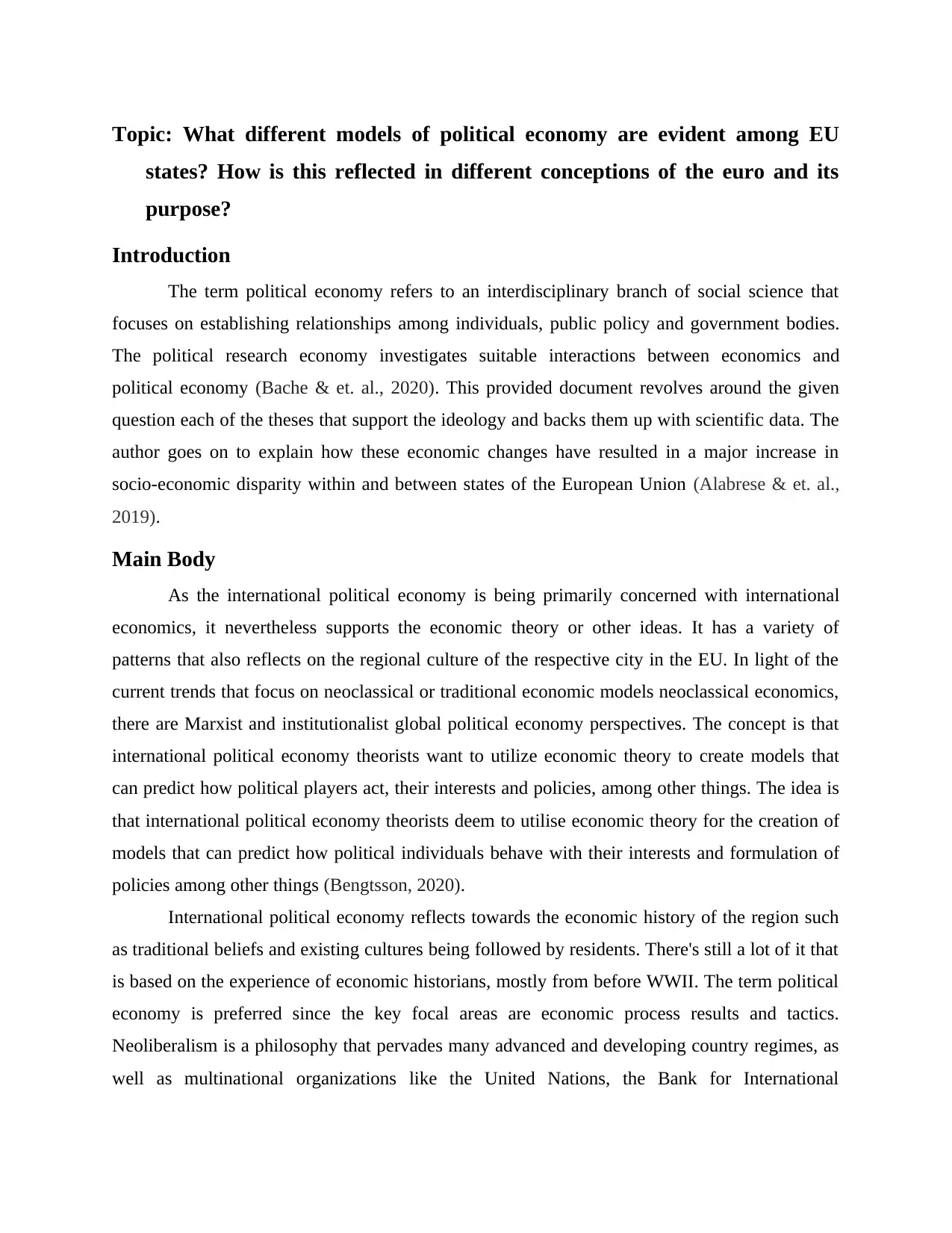
Topic: What different models of political economy are evident among EU
states? How is this reflected in different conceptions of the euro and its
purpose?
Introduction
The term political economy refers to an interdisciplinary branch of social science that
focuses on establishing relationships among individuals, public policy and government bodies.
The political research economy investigates suitable interactions between economics and
political economy (Bache & et. al., 2020). This provided document revolves around the given
question each of the theses that support the ideology and backs them up with scientific data. The
author goes on to explain how these economic changes have resulted in a major increase in
socio-economic disparity within and between states of the European Union (Alabrese & et. al.,
2019).
Main Body
As the international political economy is being primarily concerned with international
economics, it nevertheless supports the economic theory or other ideas. It has a variety of
patterns that also reflects on the regional culture of the respective city in the EU. In light of the
current trends that focus on neoclassical or traditional economic models neoclassical economics,
there are Marxist and institutionalist global political economy perspectives. The concept is that
international political economy theorists want to utilize economic theory to create models that
can predict how political players act, their interests and policies, among other things. The idea is
that international political economy theorists deem to utilise economic theory for the creation of
models that can predict how political individuals behave with their interests and formulation of
policies among other things (Bengtsson, 2020).
International political economy reflects towards the economic history of the region such
as traditional beliefs and existing cultures being followed by residents. There's still a lot of it that
is based on the experience of economic historians, mostly from before WWII. The term political
economy is preferred since the key focal areas are economic process results and tactics.
Neoliberalism is a philosophy that pervades many advanced and developing country regimes, as
well as multinational organizations like the United Nations, the Bank for International
states? How is this reflected in different conceptions of the euro and its
purpose?
Introduction
The term political economy refers to an interdisciplinary branch of social science that
focuses on establishing relationships among individuals, public policy and government bodies.
The political research economy investigates suitable interactions between economics and
political economy (Bache & et. al., 2020). This provided document revolves around the given
question each of the theses that support the ideology and backs them up with scientific data. The
author goes on to explain how these economic changes have resulted in a major increase in
socio-economic disparity within and between states of the European Union (Alabrese & et. al.,
2019).
Main Body
As the international political economy is being primarily concerned with international
economics, it nevertheless supports the economic theory or other ideas. It has a variety of
patterns that also reflects on the regional culture of the respective city in the EU. In light of the
current trends that focus on neoclassical or traditional economic models neoclassical economics,
there are Marxist and institutionalist global political economy perspectives. The concept is that
international political economy theorists want to utilize economic theory to create models that
can predict how political players act, their interests and policies, among other things. The idea is
that international political economy theorists deem to utilise economic theory for the creation of
models that can predict how political individuals behave with their interests and formulation of
policies among other things (Bengtsson, 2020).
International political economy reflects towards the economic history of the region such
as traditional beliefs and existing cultures being followed by residents. There's still a lot of it that
is based on the experience of economic historians, mostly from before WWII. The term political
economy is preferred since the key focal areas are economic process results and tactics.
Neoliberalism is a philosophy that pervades many advanced and developing country regimes, as
well as multinational organizations like the United Nations, the Bank for International
⊘ This is a preview!⊘
Do you want full access?
Subscribe today to unlock all pages.

Trusted by 1+ million students worldwide
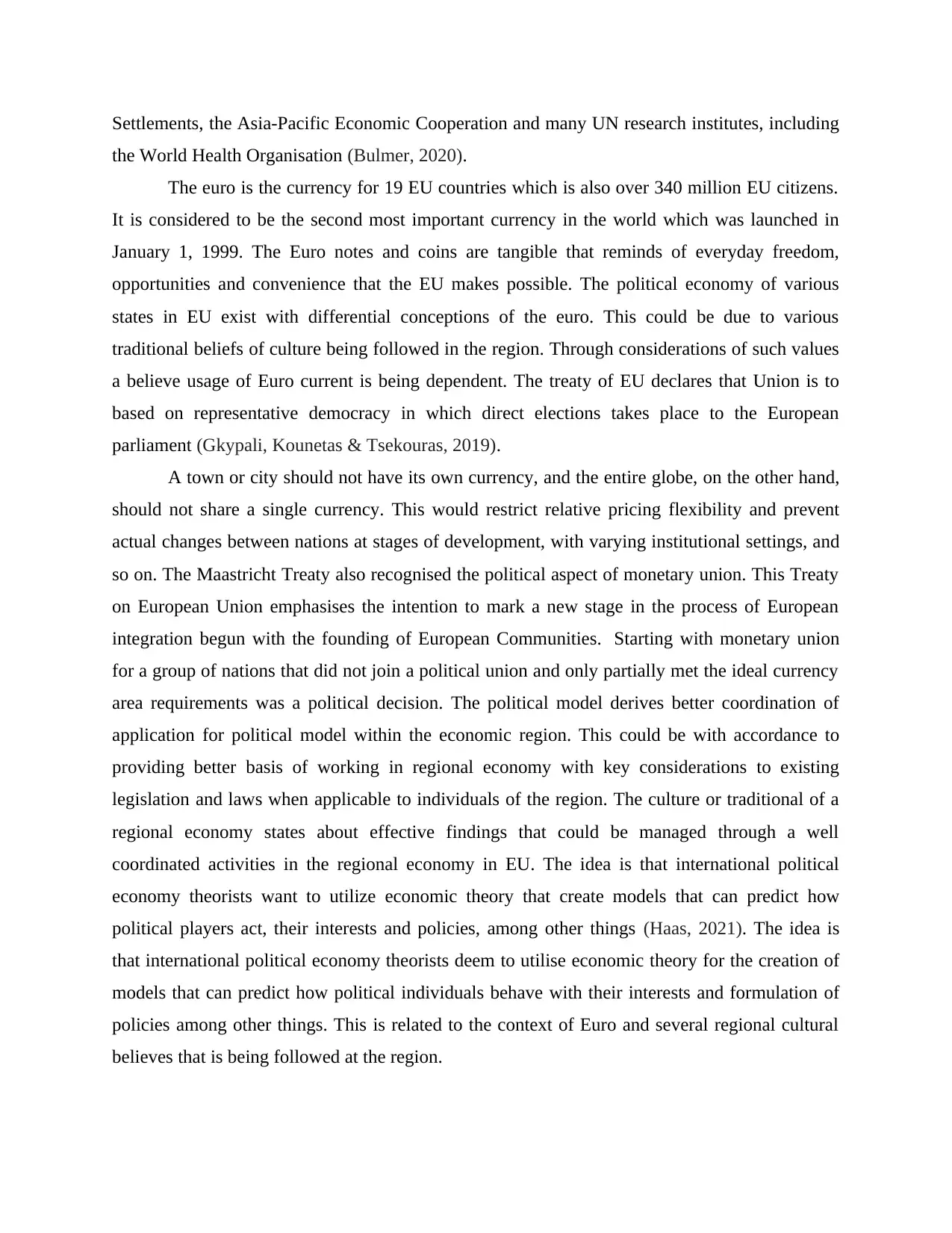
Settlements, the Asia-Pacific Economic Cooperation and many UN research institutes, including
the World Health Organisation (Bulmer, 2020).
The euro is the currency for 19 EU countries which is also over 340 million EU citizens.
It is considered to be the second most important currency in the world which was launched in
January 1, 1999. The Euro notes and coins are tangible that reminds of everyday freedom,
opportunities and convenience that the EU makes possible. The political economy of various
states in EU exist with differential conceptions of the euro. This could be due to various
traditional beliefs of culture being followed in the region. Through considerations of such values
a believe usage of Euro current is being dependent. The treaty of EU declares that Union is to
based on representative democracy in which direct elections takes place to the European
parliament (Gkypali, Kounetas & Tsekouras, 2019).
A town or city should not have its own currency, and the entire globe, on the other hand,
should not share a single currency. This would restrict relative pricing flexibility and prevent
actual changes between nations at stages of development, with varying institutional settings, and
so on. The Maastricht Treaty also recognised the political aspect of monetary union. This Treaty
on European Union emphasises the intention to mark a new stage in the process of European
integration begun with the founding of European Communities. Starting with monetary union
for a group of nations that did not join a political union and only partially met the ideal currency
area requirements was a political decision. The political model derives better coordination of
application for political model within the economic region. This could be with accordance to
providing better basis of working in regional economy with key considerations to existing
legislation and laws when applicable to individuals of the region. The culture or traditional of a
regional economy states about effective findings that could be managed through a well
coordinated activities in the regional economy in EU. The idea is that international political
economy theorists want to utilize economic theory that create models that can predict how
political players act, their interests and policies, among other things (Haas, 2021). The idea is
that international political economy theorists deem to utilise economic theory for the creation of
models that can predict how political individuals behave with their interests and formulation of
policies among other things. This is related to the context of Euro and several regional cultural
believes that is being followed at the region.
the World Health Organisation (Bulmer, 2020).
The euro is the currency for 19 EU countries which is also over 340 million EU citizens.
It is considered to be the second most important currency in the world which was launched in
January 1, 1999. The Euro notes and coins are tangible that reminds of everyday freedom,
opportunities and convenience that the EU makes possible. The political economy of various
states in EU exist with differential conceptions of the euro. This could be due to various
traditional beliefs of culture being followed in the region. Through considerations of such values
a believe usage of Euro current is being dependent. The treaty of EU declares that Union is to
based on representative democracy in which direct elections takes place to the European
parliament (Gkypali, Kounetas & Tsekouras, 2019).
A town or city should not have its own currency, and the entire globe, on the other hand,
should not share a single currency. This would restrict relative pricing flexibility and prevent
actual changes between nations at stages of development, with varying institutional settings, and
so on. The Maastricht Treaty also recognised the political aspect of monetary union. This Treaty
on European Union emphasises the intention to mark a new stage in the process of European
integration begun with the founding of European Communities. Starting with monetary union
for a group of nations that did not join a political union and only partially met the ideal currency
area requirements was a political decision. The political model derives better coordination of
application for political model within the economic region. This could be with accordance to
providing better basis of working in regional economy with key considerations to existing
legislation and laws when applicable to individuals of the region. The culture or traditional of a
regional economy states about effective findings that could be managed through a well
coordinated activities in the regional economy in EU. The idea is that international political
economy theorists want to utilize economic theory that create models that can predict how
political players act, their interests and policies, among other things (Haas, 2021). The idea is
that international political economy theorists deem to utilise economic theory for the creation of
models that can predict how political individuals behave with their interests and formulation of
policies among other things. This is related to the context of Euro and several regional cultural
believes that is being followed at the region.
Paraphrase This Document
Need a fresh take? Get an instant paraphrase of this document with our AI Paraphraser
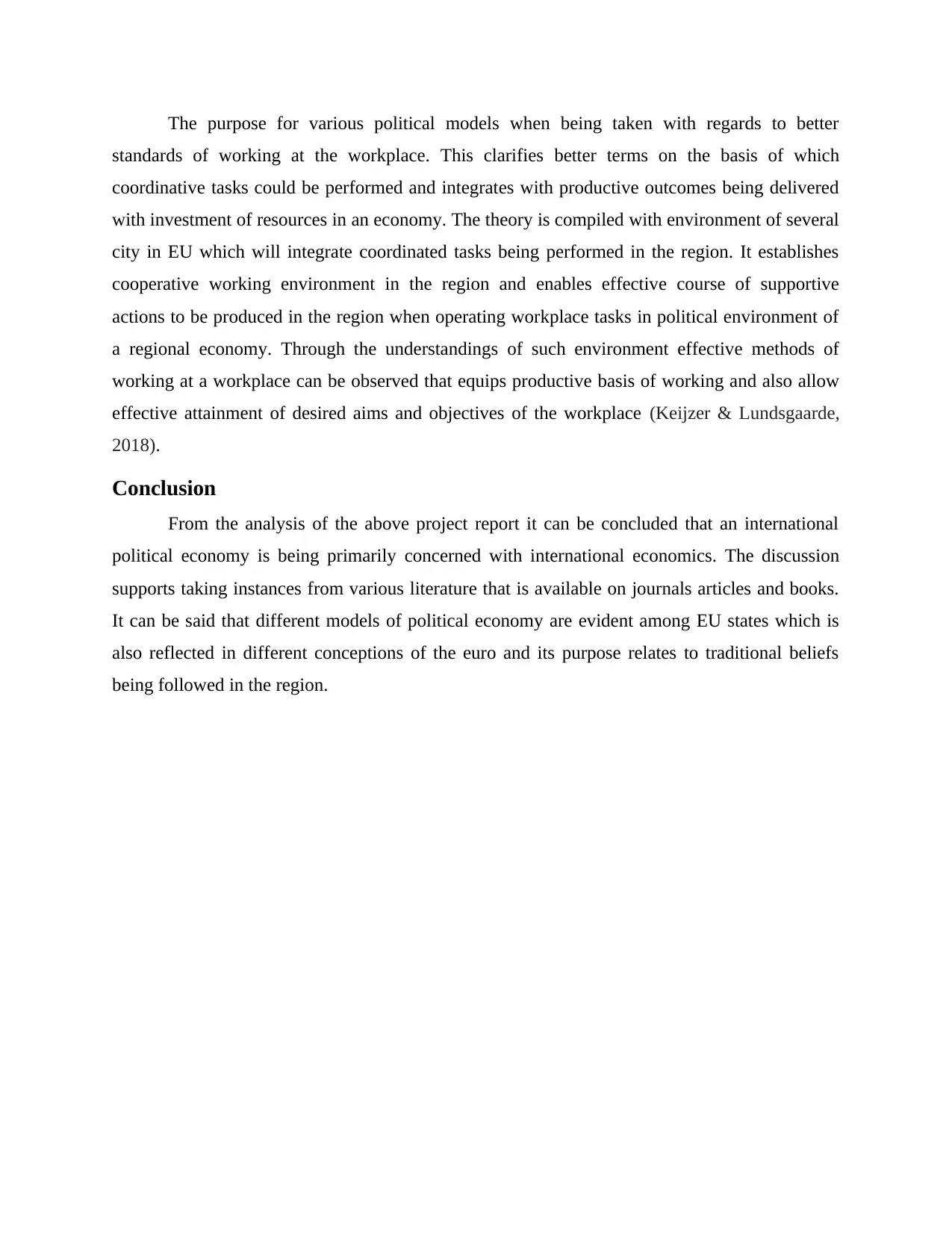
The purpose for various political models when being taken with regards to better
standards of working at the workplace. This clarifies better terms on the basis of which
coordinative tasks could be performed and integrates with productive outcomes being delivered
with investment of resources in an economy. The theory is compiled with environment of several
city in EU which will integrate coordinated tasks being performed in the region. It establishes
cooperative working environment in the region and enables effective course of supportive
actions to be produced in the region when operating workplace tasks in political environment of
a regional economy. Through the understandings of such environment effective methods of
working at a workplace can be observed that equips productive basis of working and also allow
effective attainment of desired aims and objectives of the workplace (Keijzer & Lundsgaarde,
2018).
Conclusion
From the analysis of the above project report it can be concluded that an international
political economy is being primarily concerned with international economics. The discussion
supports taking instances from various literature that is available on journals articles and books.
It can be said that different models of political economy are evident among EU states which is
also reflected in different conceptions of the euro and its purpose relates to traditional beliefs
being followed in the region.
standards of working at the workplace. This clarifies better terms on the basis of which
coordinative tasks could be performed and integrates with productive outcomes being delivered
with investment of resources in an economy. The theory is compiled with environment of several
city in EU which will integrate coordinated tasks being performed in the region. It establishes
cooperative working environment in the region and enables effective course of supportive
actions to be produced in the region when operating workplace tasks in political environment of
a regional economy. Through the understandings of such environment effective methods of
working at a workplace can be observed that equips productive basis of working and also allow
effective attainment of desired aims and objectives of the workplace (Keijzer & Lundsgaarde,
2018).
Conclusion
From the analysis of the above project report it can be concluded that an international
political economy is being primarily concerned with international economics. The discussion
supports taking instances from various literature that is available on journals articles and books.
It can be said that different models of political economy are evident among EU states which is
also reflected in different conceptions of the euro and its purpose relates to traditional beliefs
being followed in the region.
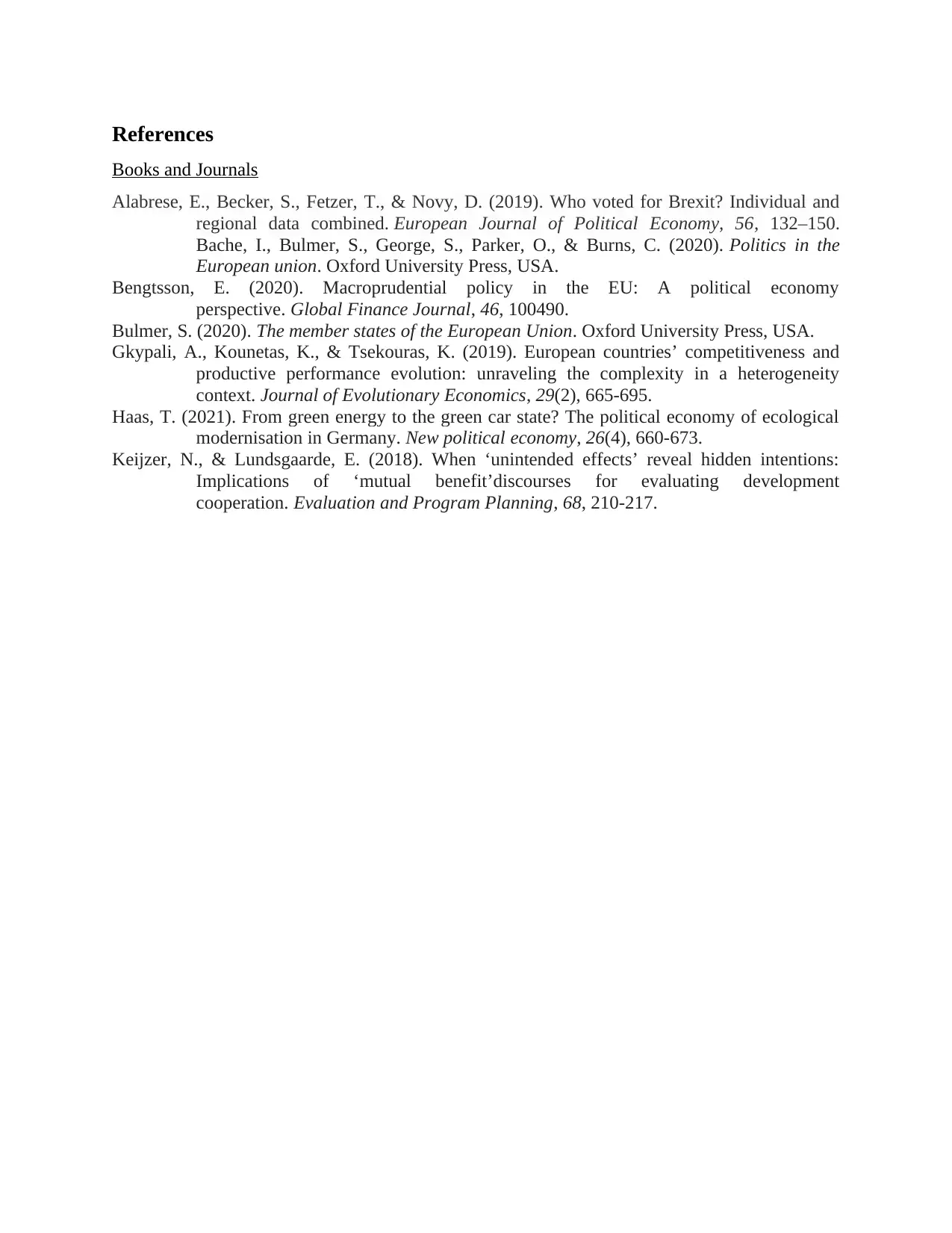
References
Books and Journals
Alabrese, E., Becker, S., Fetzer, T., & Novy, D. (2019). Who voted for Brexit? Individual and
regional data combined. European Journal of Political Economy, 56, 132–150.
Bache, I., Bulmer, S., George, S., Parker, O., & Burns, C. (2020). Politics in the
European union. Oxford University Press, USA.
Bengtsson, E. (2020). Macroprudential policy in the EU: A political economy
perspective. Global Finance Journal, 46, 100490.
Bulmer, S. (2020). The member states of the European Union. Oxford University Press, USA.
Gkypali, A., Kounetas, K., & Tsekouras, K. (2019). European countries’ competitiveness and
productive performance evolution: unraveling the complexity in a heterogeneity
context. Journal of Evolutionary Economics, 29(2), 665-695.
Haas, T. (2021). From green energy to the green car state? The political economy of ecological
modernisation in Germany. New political economy, 26(4), 660-673.
Keijzer, N., & Lundsgaarde, E. (2018). When ‘unintended effects’ reveal hidden intentions:
Implications of ‘mutual benefit’discourses for evaluating development
cooperation. Evaluation and Program Planning, 68, 210-217.
Books and Journals
Alabrese, E., Becker, S., Fetzer, T., & Novy, D. (2019). Who voted for Brexit? Individual and
regional data combined. European Journal of Political Economy, 56, 132–150.
Bache, I., Bulmer, S., George, S., Parker, O., & Burns, C. (2020). Politics in the
European union. Oxford University Press, USA.
Bengtsson, E. (2020). Macroprudential policy in the EU: A political economy
perspective. Global Finance Journal, 46, 100490.
Bulmer, S. (2020). The member states of the European Union. Oxford University Press, USA.
Gkypali, A., Kounetas, K., & Tsekouras, K. (2019). European countries’ competitiveness and
productive performance evolution: unraveling the complexity in a heterogeneity
context. Journal of Evolutionary Economics, 29(2), 665-695.
Haas, T. (2021). From green energy to the green car state? The political economy of ecological
modernisation in Germany. New political economy, 26(4), 660-673.
Keijzer, N., & Lundsgaarde, E. (2018). When ‘unintended effects’ reveal hidden intentions:
Implications of ‘mutual benefit’discourses for evaluating development
cooperation. Evaluation and Program Planning, 68, 210-217.
⊘ This is a preview!⊘
Do you want full access?
Subscribe today to unlock all pages.

Trusted by 1+ million students worldwide
1 out of 6
Related Documents
Your All-in-One AI-Powered Toolkit for Academic Success.
+13062052269
info@desklib.com
Available 24*7 on WhatsApp / Email
![[object Object]](/_next/static/media/star-bottom.7253800d.svg)
Unlock your academic potential
Copyright © 2020–2026 A2Z Services. All Rights Reserved. Developed and managed by ZUCOL.




